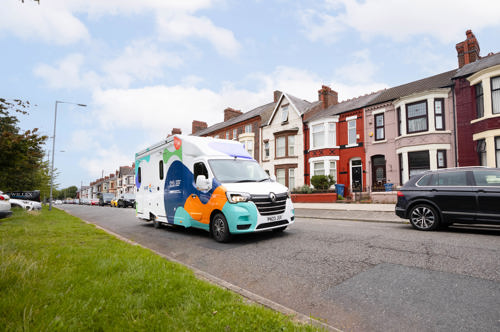Great North Research Conference hears that partnerships are key to delivering more clinical trials
Dr Seema Chauhan, EMS Healthcare’s Head of Clinical Trials, reflects on two days of thought-provoking debate.
 Seema Chauhan
Seema Chauhan
Published 06 December 2023
 Clinical research
Clinical research
The Great North Research Conference, sponsored by EMS Healthcare, attracted more than 450 delegates to the iconic setting of Manchester Airport’s Concorde Conference Centre.
This inaugural gathering, hosted by the National Institute for Health and Care Research (NIHR), showcased the life sciences and medical technology industries across the north of England, and their critical role in the delivery of clinical trials and clinical research programmes.
The keynote address came from former Health Minister, Lord James O’Shaughnessy, who led the recent review into the future of commercial clinical trials in the UK. He made it clear that for too long, there had been a reliance on hospital settings for carrying out trials, rather than focussing on marginalised communities, where clinical research is most needed.
New approach to clinical trials
In an interview with EMS Healthcare following his speech, Lord O’Shaughnessy reaffirmed his belief that a fresh approach to clinical trials was required to help tackle health inequalities:
“Every bit of the health service is under pressure, but we know that most clinicians want to do research in some way. How can we make it easier for them, that’s the big question? You’re always going to need a clinical dimension but how do we make that process as easy as possible when it comes to identifying patients, communicating with them, and retaining them on trials? That’s why a mobile and decentralised infrastructure is so important.”
And he added: “A really big part of it is getting research much closer to people, not just happening in hospitals but in primary care settings, in community settings and elsewhere.”
The NIHR is pivotal to delivering clinical research across the country and our collaboration with them is designed to support their crucial efforts in moving into areas of research that have not been done before.
EMS Healthcare’s experience during the COVID-19 pandemic showed the importance of being able to access different populations, quickly and efficiently. It also demonstrated the need to move away from traditional healthcare settings and to have a better understanding of the requirements of participants.
Getting closer to our population
This aspect was echoed by Professor Andrew Ustianowski, the Joint National Specialty Lead for Infection at the NIHR Clinical Research Network. He is also the Clinical Lead for the NIHR COVID Vaccine Research Programme:
“Mobile clinics are vitally important. A lot of the studies that are going to make a real difference to our population require people in the general public, or in our communities. We can’t do that just being based in NHS facilities.
“We really do need to take research to those individuals – whether it’s a van going to a supermarket car park or by other innovative means – we just need to change the mindset. Ultimately, our patients will benefit, our population will benefit, and our country will benefit.”
Among the exhibits at the Great North Research Conference was ‘Kitty’, EMS Healthcare’s mobile research bus, that we are currently providing for NIHR Clinical Research Network North West Coast. The unit takes its name from Catherine Wilkinson, who saved many lives from cholera by opening the first public washhouse in Liverpool in 1832.
Reducing the patient burden
The research bus is helping the NIHR Clinical Research Network North West Coast to directly engage with local communities and provide accessible trial sites, enabling more people to participate in health research.

Professor Enitan Carrol is Clinical Director of the NIHR’s North West Coast Network and chaired the Great North Research Conference. She is also Professor of Paediatric Infection at the University of Liverpool and Honorary Consultant in Paediatric Infectious Diseases and Immunology at Alder Hey Children’s NHS Foundation Trust.
Professor Carrol says getting ‘Kitty’ out into communities is a significant step forward:
“It was something that I wanted to see from day one. We think that we live in a wealthy society but there are communities that are so marginalised, that don’t go to secondary care, that never take part in research and my vision was that having a mobile research unit would help us to reach some of those groups. It’s not just the number of participants that matters but the representation of different groups – inclusivity and diversity in clinical trials is what we want to see.”
Focus on people-centred research
As the conference drew to a close, the government published its detailed response* to the O’Shaughnessy review and set out its plans for implementing nearly 30 recommendations. Two key aspects of the government’s plan resonated strongly with the conference theme:
- People-centred research to make it easier for patients, service users and members of the public across the UK to access research and be involved in the design of research, and to have the opportunity to take part.
- Regulators should produce guidance to support and promote innovative and decentralised trials.
With the decline in the number of commercial clinical trials initiated in the UK showing welcome signs of recovery, it is clear from talking to delegates that strong partnerships are essential for a sustainable long-term improvement in UK clinical trial performance.
EMS Healthcare’s work with the NIHR is but one strand of a shared strategy that we believe can and will make a difference.
Find out more about how we can help your clinical trial or clinical research programme by talking to our team: https://www.ems-healthcare.com/clinical-research/
*Source: Gov UK, November 2023